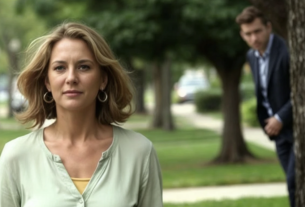Anna knew in advance that going there was a lousy idea. But Dmitry kept coaxing her in that bored tone of his, as if they were discussing the weather or the dollar exchange rate.
“It’s my mom… No need to make a tragedy out of it. We’ll go for a couple of hours—done.”
Anna stood at the mirror, pulling on her jeans. It was the third month since her promotion in the department, and there wasn’t a shred of time left for “let’s go to Mom’s.”
“She doesn’t like me, Dima. She doesn’t even try to pretend she respects me. Do you really not notice?” Her voice sounded calm, but inside everything was already boiling.
Dmitry shrugged.
“That’s just her character. She’s like that with everyone. Even her cat.” He smirked, staring at his phone.
Anna looked at him.
“Did you just compare me to her cat?”
“Oh, for God’s sake, you’re twisting things again…”
The car was quiet. Dmitry turned on some pop station so they wouldn’t have to talk. Anna watched out the window. Friday. Traffic jams. The sixth time that year going to see Yelena Petrovna—and every time like an exam, only the grade was always a guaranteed F. Everything about Anna was “wrong”: the way she spoke, her hairstyle, shoes, profession, and Anna herself—also “wrong.”
Her mother-in-law’s building was a Soviet sixteen-story brick block where even the smells in the stairwell hadn’t changed since the ’90s. On their floor a plum-colored door awaited, with a sign: “Doorbell broken, knock.”
Anna knocked.
“Soon that sign will be on me too,” she muttered under her breath. “‘Doorbell doesn’t work.’”
Yelena Petrovna opened the door with the expression of someone finding a ticket inspector at the threshold.
“Oh, Anya, you actually came. I thought you had quarterly reports and sleepless nights. Well, come in…”
“Hello,” Anna nodded stiffly and stepped inside.
Cabbage rolls were already steaming on the table. Next to them, Olivier salad; in the fridge, as always, a cake with expired frosting.
“Are you a guest today, or like always—sit on your phone, go home, and say you’re ‘tired’?” the mother-in-law sneered, laying out napkins.
“Tired doesn’t mean I’m trying to avoid you,” Anna replied evenly, taking off her coat.
“That to me?” The older woman arched a brow. “I’m only happy to see you. We don’t get such important guests every day.”
“Mom, that’s enough,” Dmitry muttered without looking up from his screen.
Anna perched on the edge of the sofa. Yelena Petrovna brought tea and sat opposite, arms crossed.
“You’re not coming on Monday, are you?”
“What’s Monday?” Anna tensed.
“Well, my 60th, of course. A milestone. But you’re probably busy. Quarterly reports, yes?”
Anna froze.
“You didn’t invite me.”
“Oh, did I need to? I thought Dmitry would pass it along. Although… maybe I just didn’t want to spoil my own party. At my age I try to think about myself.”
“Mom, seriously…” Dmitry looked up from his phone. “Did you really not invite Anya?”
“Don’t start. You’re the one who said she always has excuses. First work, then her health, then her friend got sick, then work again… I’m tired of guessing when she’ll condescend to show up.”
Anna set her cup down slowly.
“I see. Fine, thank you. I am, in fact, busy.”
She stood up. Dmitry tried to grab her hand.
“Anya, where are you going?”
“Home. To my place. Where, you know, no one treats me like an extra.”
“Oh come on… So Mom said something stupid—now what?” He bustled up, stood, followed her.
His mother snorted.
“It’s always like this. She leaves in tears, then you give me grief. I warned you, son. She’s not your woman. She’s about career, not family. With her loans, mortgages, and ‘independence.’”
Anna turned.
“I’m not about ‘family’? Seriously? You don’t even know your own son. Or how many nights he slept at colleagues’ because you threw a fit. Or how much money he owes me. You think poorly of me, fine—but at least I keep my mouth shut. You, on the other hand, spit in my face. On your birthday and any other day.”
Something like anger flickered in the mother-in-law’s eyes, but she quickly covered it with a fake smile.
“You clearly have self-esteem issues. I’m the enemy, right?”
“No, you’re a mirror. But not for me— for Dmitry. I look at you and I understand why he never supports me. He’s afraid of becoming you. Or he already has.”
A tomb-like silence fell. Even the radio in the room seemed to go quiet, as if it didn’t dare interfere.
Anna yanked on her coat, grabbed her bag, and left. Dmitry didn’t follow. He only shouted from the doorway:
“And where are you going now? Gonna waste your bonus money on a taxi?”
Anna went down the stairs. A notice in the elevator read: “Does not stop on floors five through eight. Sorry for the inconvenience.”
“Kind of like my life right now,” she smirked. “Neither here nor there.”
It was cold outside. Her phone blinked with incoming messages: “Dimka”—three times. Then “Don’t sulk.” Then nothing. Emptiness.
Anna called a cab, got in, and finally let herself cry. Not hysterically. Just—like with a cold, when your throat tickles and the tears roll on their own.
The driver turned on some music. An old song from the 2000s.
“Louder, please,” she said, wiping her tears.
“Did someone dump you?” he asked without turning around.
“No. I left.” And for the first time in a long while she felt she had done something right.
The next morning Anna woke to the microwave beeping. It was only seven a.m. Outside, a blizzard had piled up like in a Hollywood movie—wild, blinding. That would’ve been fine, except someone was heating dumplings in the microwave. And Anna knew for sure—it wasn’t Dmitry. He could forget his mother’s birthday, but he couldn’t eat before eight.
She walked out in a robe, hair tousled, the face of a woman who’d slept four hours and knew perfectly well—she’d been deceived.
“You look lovely,” said Yelena Petrovna, turning to her with a plate bearing six greasy dumplings and a blob of ketchup.
“What are you doing here?” Anna leaned against the doorframe, arms crossed.
“Caught a chill, my radiators in the living room aren’t heating. Dima said, ‘Come over, rest a day.’ You’ve got it nice and warm here, elite building, everything fancy,” she said in that tone that turns every word into a jab.
“Wonderful. And you’re not planning to go to work? Or did you also take family leave?”
“You know I’m on a pension; I don’t owe anyone anything. And you, Anechka, be a dear and don’t finish the dumplings, I brought them with me. Mine, from Magnit.”
Anna turned and went back to the bedroom. Three minutes later the door cracked open and Dmitry slipped in.
“What’s with you? Another morning scene?”
“Don’t you think that before bringing into our home a person I’m, by the way, not on the best terms with, you could at least give me a heads-up?”
“She’s my mother, Anya. She has a fever—what, was I supposed to throw her out on the street?”
“She had a ‘fever’ two years ago when she tried to make me look like an idiot in front of your friends. Since then she’s had immunity to conscience. How long is she staying?”
“Two days… three… four at most.”
Anna didn’t answer. She silently pulled on jeans and a T-shirt, grabbed her bag, and left. She got to work earlier than anyone. Colleagues traded surprised looks—Anna usually ran ten minutes late. This time she was fifteen minutes early.
A week later, the apartment was haunted by a constant draft of words tossed out “by the way,” and looks full of passive aggression. Dmitry tried not to get involved. He left early, came back late. Sometimes he didn’t come back at all.
One day Anna stumbled on his messenger. She was looking for a recipe for chicken with pomegranate, but her fingers automatically scrolled up. There was “Oksana. 32. Lawyer.” And a long thread full of chuckles, heart emojis, and lines like “Sometimes I think I married the wrong woman.”
Anna didn’t throw a fit. She didn’t start any spy games. She just walked into the kitchen and asked:
“How long have you known Oksana?”
Dmitry looked as startled as if she’d asked him about the political situation in Afghanistan.
“What?”
“Well, it’s just that your phone has half a page of love declarations and words I haven’t heard from you for, what, six years. Actually, never. Has she been in our life long?”
“Anya, you’ve got it all wrong… It’s just… just talk. We work together.”
“And I thought the only things at your office were Pavel from logistics and the cafeteria on the first floor. Although, come to think of it, you must have romance in the cafeteria too.”
“Are you out of your mind? Don’t shout, my mother will hear.”
“Oh? And it didn’t occur to you that it’s not your mother who’ll hear, but your wife? Or is it now ‘the one I still live with until Oksana is free’?”
Dmitry walked out of the kitchen without a word, slamming the door so hard a postcard of Minsk fell off the fridge. His mother had brought it once. Anna picked it up, looked at it, crumpled it. Then—uncrumpled it and stuck it back. Let Minsk stay. As a reminder that even cities make mistakes.
At work everything suddenly shot upward. Anna got a promotion. Now she wasn’t just an accountant, but the lead specialist for managing cash flows. Her salary went up forty percent. Colleagues congratulated her, the boss shook her hand and mumbled, “Finally, someone in this office doesn’t get pregnant every March.”
Anna came home in a good mood. She didn’t feel like going, but the apartment was hers, after all. Period.
In the kitchen she found Yelena Petrovna drinking coffee out of her favorite mug that said “I hate people until 8 a.m.” It was seven-thirty.
“Congrats on the promotion,” the older woman muttered without looking up from her phone. “Guess now you’ll come home with an even bigger pout?”
“Thanks. I might not come home at all, in fact. Because now I can afford that.”
“Well, good for you. Just don’t forget to take your husband. I’m giving him to you.”
“Don’t strain yourself, Yelena Petrovna, a gift is supposed to be valuable. This one’s more of a clearance item.”
That evening Dmitry came in with a grocery bag. He stared at the floor.
“You read everything, didn’t you?”
“No. I reread it. I even bookmarked the especially disgusting parts. Want me to show you?”
“I didn’t want things to turn out like this.”
“But they did. Like your mother’s dumplings.”
Silence.
“I don’t want a divorce, Anya.”
“And I don’t want to be a backup airfield. Or, as she says, ‘live in an elite apartment at someone else’s expense.’ Although the apartment, for the record, is mine. I bought it before you, and before your mommy. And I can kick both of you out tomorrow if I like.”
Dmitry paled.
“You wouldn’t do that.”
“Look at me closely. I’m now the lead specialist in cash flow management. You think I can’t handle a flow of two suitcases?”
He went to the bedroom. Slammed the door again. As if that added to his masculinity.
Anna sat at the table and opened her laptop. She started writing a divorce petition.
And then Yelena Petrovna walked in holding a can of paint.
“Anna, I’ve been thinking. Since you’re so independent, how about you pay for the renovation in my room? I’ve picked a color—warm sandy. Like normal people have in Sochi.”
Anna lifted her head. Slowly. Without a smile.
“Do you really want me to answer right now? Or should I give you two more minutes to think over your last chance of staying alive?”
A week passed. The blizzard turned to rain, and Yelena Petrovna—to silence. She moved to Balashikha, where a sofa with a sunken armrest, Grandma’s dresser, and the smell of cat litter (despite never having got a cat) awaited her.
Anna felt relieved. But not victorious. No triumph, no pain—just calm, like after a long illness. In the apartment you could suddenly hear the kitchen tap dripping. And the bedroom floor creaking in the evenings.
She sat in the kitchen, scrolling through old photos on her phone. In one—she and Dmitry, smiling. Summer, shashlik, someone had just lit the coals in the frame and everyone was laughing. She looked about thirty, he the same age, but with a face not yet touched by cynicism.
The doorbell rang. Dmitry stood there with flowers and a bottle of wine.
“May I?”
“Depends what for.”
“To talk. Without swearing, threats, or your signature ‘we’ll see.’”
Anna stepped back into the hallway. He came in, leaving his shoes at the door, like before, when he was still “one of us.”
“I’m an idiot,” he said, staring at the floor. “I behaved like a teenager handed a car and told to go. And I went—over people, over feelings, over you.”
“Deep metaphor. Now—what do you actually want? Spare me the theater.”
He slumped into a chair.
“I want to start over. No lies. No… mom. No Oksanas. Just you.”
Anna leaned against the fridge.
“Did you realize I can live without you? Or are you just scared you’ll have to iron your shirts yourself?”
“Both. I’m no hero. But at least I’m honest. Now.”
“Now? And before that what—were we in a comic book?”
“Anya… I was lost. I always felt you were stronger than me. With Oksana I felt needed.”
“Weak men always look for those who admire them. Even if it’s a dog. Or a lawyer with a savior complex.”
“I don’t want to play anymore. I’m ready for whatever you say.”
“Exactly. ‘Whatever I say.’ That’s how it’s going to be now. If you want to be here—you live by my rules. Not one decision behind my back. Not one secret. And your mother doesn’t set foot in here again. Understood?”
He nodded. Slowly. Not right away—as if it physically hurt.
“And one more thing,” she added, “if you even think about looking for comfort on the side again—you leave. No scandal, no door-slamming, no drama. You just leave. I’m done surviving. I’m living.”
“Agreed.”
She came closer. Took the flowers, put them in water. Set the wine on the table. Sat across from him.
“Want to stay for dinner?”
He smiled a little, like that day at the barbecue.
“Very much.”
“Then grab a pan. I’m making risotto, and you’re chopping the onions. And don’t whine.”
“Yes, chef.”
“Not chef. I’m the lady of the house. And you’re the one who got a second chance. Don’t mix that up.”
A month later life looked like a chessboard. Black, white, pauses, reflection. Not love with flowers and poems, but a partnership where you’re responsible for every piece. Where there’s no second mistake. And Anna liked that. Because now—everything was on her terms.
The frame with the Minsk postcard stayed on the hallway wall. But inside it now was not Belarus, but a black-and-white photo: an empty old road and a sign that read “Borders.” A gift from a photographer friend. A symbol.
Anna looked at it every evening. And thought: the most important thing is to draw the line in time. Even if you then have to live next to someone you once forgave.


